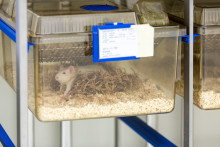Why is your name among the signatories?
'Because I am concerned. We are not saying farewell to the use of laboratory animals in biomedical science fast enough. Especially the Netherlands, which is leading in the development of alternatives, is not doing enough about this. This is because many scientists are of the old school and still continue to use laboratory animals. They are used to it and it is difficult for them to transition to the potential alternatives. And proving that alternatives work just as well - often even better - is very difficult.’
What are these alternatives?
‘One of the current alternatives are organ-on-chip technologies. These advanced miniaturized models are able to replicate some of the key characteristic of the human physiology such as the mechanical stimuli and the immune system. Let me emphasize that completely excluding laboratory animals from biomedical science is not an option for now. That will take decades, but particularly in drug testing we can make a drastic difference with organ-on-a-chip technology. Yet that happens far too little.'
In the advertisement, you mainly address the Dutch government. Why should the Netherlands take the lead?
'Within the EU, the Netherlands is leading the way when it comes to innovations. Moreover, the Netherlands promised in 2016 to take the lead. That's why there should be a national action plan, which can serve as an example for the European Commission. And if we talk about organ-on-a-chip technology, there is no country in which so many companies are engaged in that technology. At the UT, we have established an organ-on-a-chip center and we are currently achieving great goals in the transition to an animal-free biomedical science.'
The ad comes from the not uncontroversial animal rights organization PETA. Did you hesitate to sign the ad?
'No and I don't regret it either. Just because I support this action doesn't mean I support everything PETA does. It's a huge organization with many different pillars. The goal of the ad is to create more awareness and I fully support that.'
Carlo Alberto Paggi completed his PhD at UT this month and is now starting a spin-off company using organ-on-chip technology under the name of chiron.






